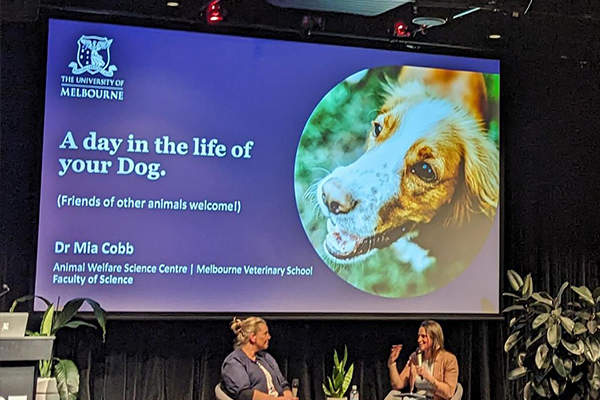Science Festival Masterclasses bring research to the public
During National Science Week 2023, as part of the University of Melbourne’s annual Science Festival, academics from the Faculty of Science presented five masterclasses on topics ranging from weather systems to volcanoes, artificial intelligence (AI), animal welfare, and food science.
Hosted by Julia Cleghorn, Manager of STEM Outreach Programs, the lunchtime events were held in-person and/or online and attracted an audience of about 700 people from across Australia and overseas.
“The masterclasses are designed for any science-curious adult or senior secondary student who wants to know more about what’s happening at the cutting edge of research. We tackle challenging topics in an engaging and accessible way, with plenty of audience participation,” said Ms Cleghorn.

Dr Mia Cobb (left) and Julia Cleghorn presented a masterclass at Science Gallery Melbourne.
On Monday 14 August, Lecturer Dr Josephine Brown and graduate researcher Ruby Lieber from the School of Geography, Earth and Atmospheric Sciences presented the first masterclass entitled ‘Oh boy, here comes El Niño!’
“El Niño – meaning ‘the little boy’ – and La Niña (‘the little girl’) are oscillating phases of a massive ocean-atmosphere interaction that strongly influences Australia’s year-to-year climate variability, driving floods, droughts, and bushfires,” Dr Brown said.
“We need to understand how global warming will affect this. It’s likely that climate change will exacerbate the impacts of El Niño.”
Dr Hayden Dalton, an Associate Lecturer in the SGEAS, explained what lava can tell us about human evolution and our planet’s composition in ‘Volcanoes: from distant ancestors to diamonds’ on 15 August.
“I’m developing methods for more accurately dating ancient volcanic ash deposits in Africa to determine the age of human fossils found in geological layers above or below the ash,” said Dr Dalton.
“I also study diamond-carrying volcanic eruptions from the deep earth, to learn more about the physical and chemical characteristics of our planet’s interior.”
Matthew Mack, a Teaching Associate in the School of Mathematics and Statistics presented Wednesday’s masterclass entitled ‘Hotdogs, triangles, and AI: pattern finding in machine learning’, in which he encouraged the audience to contribute perspectives on mathematics and how they define a sandwich.
“There are patterns in numbers, language, nature, and everywhere,” Mr Mack said. “Humans are hard-wired to notice patterns, mathematicians analyse and model them, and machines are learning to recognise and apply them.
“Researchers at OPTiMA analyse problems that are too complex for current AI to solve. AI may find patterns humans miss but can also make mistakes. In my masterclass, I aimed to help people think about why this happens and to better understand the power and limitations of AI tools like ChatGPT.”
On 17 August, with assistance from a trainee guide dog, Dr Mia Cobb presented ‘A day in the life of your dog (cat-lovers welcome)’, a hybrid (in-person/online) event at Science Gallery Melbourne.
“Other animals experience the world quite differently to humans. For example, dogs rely heavily on their sense of smell for information about their surroundings, whereas humans depend more on their vision,” Dr Cobb said.
“We can use various physiological and behavioural measures to determine the emotional state of a dog. Research shows dogs are happier when they have some freedom to interact with the world as they choose, so they have a sense of agency or control over their lives.”
Sonja Needs, a Lecturer in the School of Agriculture, Food and Ecosystem Sciences presented the final Masterclass, ‘Sensational food science: BYO coriander seeds’, from her laboratory kitchen on Friday 18 August.
“I’m interested in what shapes our food experiences, memories, and preferences,” Ms Needs said. “For example, why are some food pairings delicious and others disgusting? What is flavour and how do you measure smells?”
Ms Needs invited the audience to gently pinch their nostrils closed while attempting to taste coriander seeds, demonstrating one example of many flavours that are not detected by our taste buds and are perceived by smell alone.
Each interactive presentation ran for 45 minutes, including live experiments, audience polls, and time for questions and discussion.
“I always enjoy the Masterclasses, especially the audience interactions,” Ms Cleghorn said. “I learn a lot and love digging into researchers’ motivations for their projects. It’s also a great opportunity for young people to quiz researchers about their study and work experiences, which can help them decide whether to pursue a career in scientific discovery.”